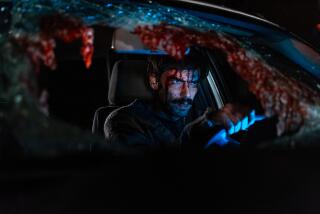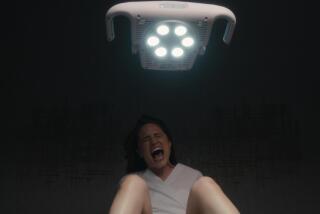Master at mind games
- Share via
AS the head of RKO’s low-budget horror unit in the 1940s, Val Lewton was supposed to crank out fright flicks that would compete with the more extravagant monster movies rolling off the conveyor belt over at Universal. He fulfilled his mandate while meeting absurdly tight deadlines and budgets, but his productions were neither cheap nor throwaway. Lewton’s poetic chillers have become landmarks for the ingenious economy of their filmmaking and for basically inventing the genre of psychological horror.
Lewton’s life and work is the subject of “The Man in the Shadows,” a new documentary by the critic Kent Jones, produced and narrated by Martin Scorsese. It premiered on TCM earlier this month and is a valuable addition to Warner Home Video’s essential “Val Lewton Horror Collection,” which is being reissued Tuesday.
Producers are not often credited with an authorial role, but Lewton, having worked as an assistant and story editor for David O. Selznick, adopted his former boss’ hands-on approach when he arrived at RKO. He started by assembling a team of trusted regulars: the then-unknown French director Jacques Tourneur, cinematographer Nicholas Musuraca and editor Mark Robson. Lewton took a pseudonymous co-writing credit only twice in his career, but he rewrote scripts extensively and controlled every aspect of the filmmaking -- as Scorsese narrates in the doc, “You could say he pre-directed his films on paper.”
Lewton had a gift for wriggling out of constraints, or better yet, turning them into strengths. With no money for special effects, he fell back on the power of suggestion. Exploiting our fear of the unknown and the magical interplay between darkness and light, his films find terror and beauty in craftily placed shadows. Obliged to meet compact running times -- his movies seldom exceeded 75 minutes -- he relied on concise scenes and brief, indelible images. The lurid, pretested titles (“Cat People,” “I Walked With a Zombie”) often came before the films.
Lewton responded to these seemingly preposterous commissions not by piling on the schlock but by evoking a sense of terror at once primal and mundane. Even when they flirt with the supernatural, his films are rooted in day-to-day anxieties.
Nine of the 11 films that Lewton made in his remarkable four-year stint at RKO are in the Warner set. The first three, all directed by Tourneur, are classics. In “Cat People” (1942), a sly, psychosexually charged variation on the werewolf myth (and a sleeper box-office hit that briefly revived the struggling studio), a young bride lives in fear of an ancient Serbian curse that she believes will turn her into a panther in the heat of passion. The lusciously atmospheric “I Walked With a Zombie” (1943) weds voodoo rituals to a plot borrowed from “Jane Eyre.” “The Leopard Man” (1943), the story of an escaped wildcat (or is it a serial killer?), features one of the most cruelly effective off-screen murders in film history.
Tourneur and Lewton were a dream match of director and producer, but the studio split them up in the hope of maximizing profit. Tourneur went on to make “Out of the Past,” one of the great noirs of the ‘40s. Lewton had the opportunity to move up to A-movies, but he opted to stay in the B-leagues, where he could avoid studio interference and continue taking creative risks. He promoted Robson and Robert Wise (who had edited “Citizen Kane”) to directors, and although their films often lacked the sensuous mystery of the Lewton-Tourneur collaborations, they were potent and provocative all the same.
“The Seventh Victim,” directed by Robson, is arguably the most chilling of devil-worship horror flicks, not for the Satanic bits of business but for its mood of overwhelming existential despair. “The Curse of the Cat People,” directed by Wise, is a sequel only in name, using the first film’s ghostly heroine to launch into a surprisingly sophisticated and empathetic study of child psychology.
As the films in this set repeatedly prove, Lewton was a different kind of producer, a rare breed in his time and even harder to find today: He made movies that were smarter and subtler than they needed to be.


